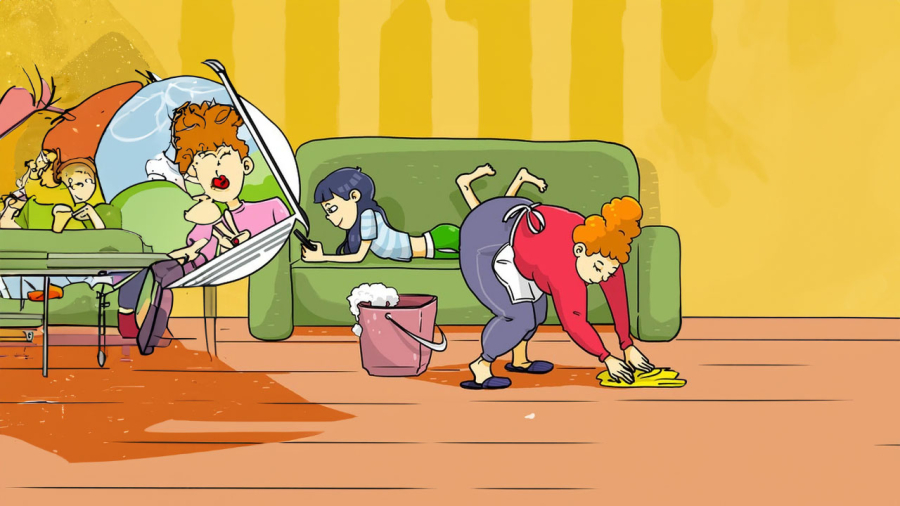Hot-tempered Mother, Difficult to Control Emotions
When you first become a parent, you may be stressed and face many challenging situations. This can make it difficult to stay calm. There are things that can happen, like a child refusing to eat, crying at night, not listening, being stubborn… This can cause you stress, especially when combined with a busy job and financial difficulties. However, it is necessary for you to control your emotions and not release hurtful words towards your child.
Not controlling your emotions can also lead to arguments between you and your spouse. Witnessing parents losing their temper can cause psychological harm to the child. You may feel remorseful and apologize to your child afterwards, but repeated incidents will cause more harm to the child. Therefore, it is important to prepare yourself mentally as a parent to maintain harmony in the family for your child.

Being a Parent can be Overwhelming Because of Your Child
Many people believe that if they struggle for their child, they will be compensated. But have you ever considered if you struggle because you handle situations poorly? Many people stay up late worrying about their child, taking care of every little thing for their child, while the child enjoys themselves and the husband is relaxed, leaving the mother in distress. This imbalance is not good. Look at how you organize and lead your family. Transforming yourself into a exhausted mother while your child enjoys without helping you and your husband being indifferent and irresponsible. This method will make the child have a distorted view of the family and make it difficult for them to find happiness when they grow up.
Mother Constantly Worries and Blames Herself
Parents should only take responsibility when they truly make mistakes, not blame themselves excessively. For example, if the child forgets something at home and gets scolded by the teacher, the mother blamed herself: “Mother is wrong, Mother is too busy, Mother apologizes to you.” That is not correct. You are leading your child to have a wrong understanding, and the child will not know how to take responsibility. Meanwhile, this situation is the child’s fault.

Mother Lacks Patience with the Child, Makes All Decisions
Many parents become impatient and act on behalf of the child instead of waiting for them to act. This method makes the child lack independence, less self-reliant, and less self-esteem. Many parents always think that young children are still naive, prone to mistakes… so they deprive the child of their rights and are not patient enough to listen to the child and wait for them to act. Parents use their authority as guardians to make decisions for the child, even forcing them to follow their own opinions. That is extremely harmful. Let the child express their own desires, be patient to wait for them to make decisions. If you are not patient enough to wait for the child to decide or accept their mistakes, then when the child grows up, you will not reap any rewards, and the child’s life will become more and more miserable.

Thinking that Being a Parent Means Protecting More
Showing love and protecting the child are different. Excessive protection will deprive the child of their growth. The child needs guidance to develop skills and experience, away from vices and bad influences, rather than being trapped in a sterile glass case. When the glass case breaks and parents are no longer able to be by their side, the child will fall and be destroyed. Therefore, parents should not overly protect their children. Nowadays, many mothers often complain: “Is there anything trustworthy in this society? Formula, skincare products, vaccines, educational environment… are all unsafe.” Protecting the child only gives you peace of mind when the child is within your reach, but when the child grows up, you cannot protect them anymore. Instead of protection, teach your child resilience, independence, and resourcefulness.
Parents Always Want to Control Everything
Many parents want their children to obey them 100%, obey their orders without question, even control their personal lives. In the eyes of many parents, when the child does not obey them, they see it as defiance and rebellion. The control of parents will not bring anything good. Many parents even impose their own life plans on their children, having children to fulfill their own life mission, not for their children to live their own lives. This way of thinking makes the child feel tired and not free, feeling indebted and obligated to repay their parents.
Remember that the child is an individual separate from you, the child has the right to live their own life, it is not their obligation to live their parents’ lives. The essence of education is “loose when necessary, tight when necessary”. If the child finds it difficult to live according to their own will, they will feel unable to think clearly and only know how to rely on their parents for help. In the long run, this becomes a vicious cycle, a mistake in educating and raising the child.
Parents who Like to Make Comparisons
Every child born is a unique individual in the world. Making comparisons will hurt and irritate the child. Just like how we don’t like being compared to someone else. Don’t compare your child with the neighbor’s child. Just encourage your child to overcome their own self is good enough. Comparison will make the child exhausted and lose motivation. Don’t scold your child just because the neighbor’s child won a prize. Don’t ask your child if they like it when the neighbor’s child starts learning swordsmanship, the result doesn’t matter, still send your child to learn.
This act of comparison will not help you or your child to focus on the child themselves, to recognize their strengths and develop them.
So if you see that you suffer, but your child does not have what other people have, it is because you are doing it wrong.
Learning Tips for Parents: 12 Japanese Techniques to Use with Your Children
Discover the 12 principles of teaching children in the traditional Japanese way that parents can learn with Dien May XANH! By instilling these principles when your children are young, you can ensure that they grow up to be obedient, smart and polite, the hallmarks of a successful education in Japan.



































